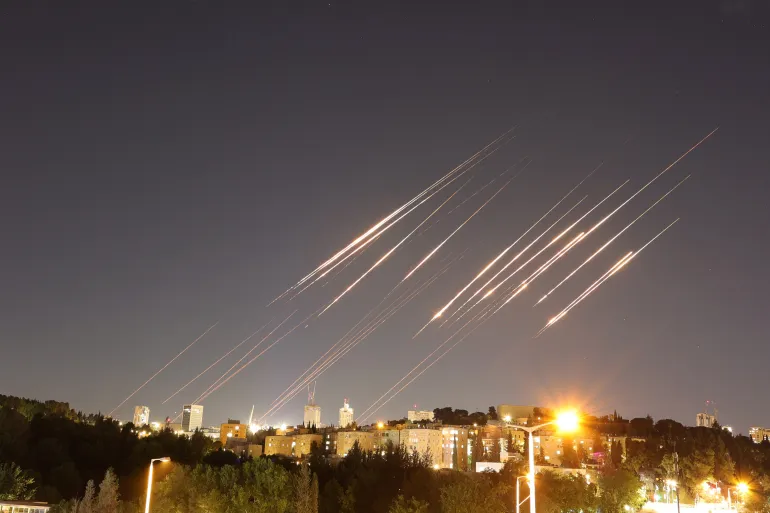The Israel-Iran conflict has spiraled into the most severe West Asian crisis since the 1973 Arab-Israeli war, with both nations engaged in an escalating exchange of missile strikes and global powers warning of a broader regional collapse.
On June 13, Israel launched a preemptive strike on Iranian nuclear facilities, killing several top Iranian generals and scientists in what it calls “Operation Rising Lion.” This marked the beginning of an intense military escalation between the two long-time adversaries.
110 Indian Students Evacuated Amid Worsening Conflict
As missiles continued to rain down on Tehran and Israeli cities, India began evacuating its citizens from Iran. The first group of 110 Indian students crossed into Armenia and is scheduled to fly to New Delhi on June 18. The Indian Embassy in Tehran has issued an emergency advisory urging nationals to evacuate immediately.
“We are monitoring the situation round-the-clock. Indian citizens in Tehran should reach out to the emergency helpline numbers,” said an official statement from the Indian Embassy.
This marks a growing concern for foreign nationals as the conflict zones expand.
Tehran Under Fire: Daily Life in Chaos
Iranians in Tehran are living under constant fear. Dramatic satellite imagery showed smoke plumes over the capital after multiple Israeli missile strikes, including one that hit the Iranian State TV compound. Civilians, including women and children, have taken shelter in metro stations, mosques, and basements due to a lack of formal warning systems.
“Everyone is leaving but I’m staying. My father says it’s more honorable to die in your home,” said a 21-year-old music student speaking anonymously to BBC Persian.
Reports describe long queues at petrol stations, packed roads, and a population caught between the regime they resist and a foreign power many do not trust.
Rising Civilian Casualties on Both Sides
According to Iranian authorities, more than 220 people have been killed in Tehran since the start of Israeli airstrikes. Meanwhile, Israeli officials reported at least 24 deaths and over 500 injuries due to retaliatory missile attacks from Iran.
Iran responded swiftly to Israel’s aggression by launching over 370 ballistic missiles, hitting multiple Israeli targets including an oil refinery in Haifa and a military research facility near Tel Aviv.
Netanyahu’s Risky Gamble
Israeli Prime Minister Benjamin Netanyahu hinted that regime change in Iran may be part of the endgame. However, Iran’s response has been forceful and sustained, proving that Tehran’s military and nuclear infrastructure is far more dispersed and resilient than anticipated.
“While Israel is trying to assert escalation dominance, Iran is establishing deterrence through offense,” said a regional security analyst.
This tit-for-tat has created an escalation spiral with no clear exit strategy in sight.
Global Powers on High Alert
The United States is reinforcing its military presence in the Middle East. Defense Secretary Pete Hegseth confirmed the deployment of additional defensive systems to safeguard U.S. interests in the region. Former President Donald Trump, currently attending the G7 summit, warned that Iran must immediately evacuate Tehran and reconsider its stance on nuclear enrichment.
“Iran should have signed the deal I proposed. This war is a waste of human life. I said it over and over again—Iran cannot have a nuclear weapon,” Trump wrote on Truth Social.
Meanwhile, Russia, a key ally of Iran, has urged restraint and called for diplomatic resolution.
Nuclear Diplomacy in Tatters
The war erupted just days before the sixth round of U.S.-Iran nuclear talks was scheduled. With diplomatic channels severed, the likelihood of a peaceful resolution is rapidly diminishing. Iran has even threatened to withdraw from the Nuclear Non-Proliferation Treaty.
What Comes Next?
Analysts warn that prolonged conflict could involve U.S. bases in the Persian Gulf, jeopardize oil shipments through the Strait of Hormuz, and destabilize neighboring countries. Civilians on both sides remain at high risk, with no shelters available in Tehran and constant sirens in Israel.
Global powers are being urged to take urgent steps to mediate a ceasefire between Israel and Iran before the situation spirals into full-scale regional war.
“This is a devastating humanitarian disaster. We don’t want the Islamic Republic, but we also don’t want our country bombed into ruins,” said an Iranian woman sheltering in a safer neighborhood.







